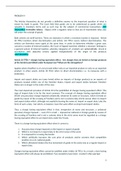-
1. Oefenvragen - Jurisprudentie verbintenissenrecht
-
2. Arresten - Jurisprudentie verbintenissenrecht
-
3. Samenvatting - Uitwerking van alle leerdoelen bij probleem 8
-
4. Samenvatting - Uitwerking van de leerdoelen probleem 7 verbintenissenrecht
-
5. Samenvatting - Uitwerking leerdoelen probleem 5 verbintenissenrecht
-
6. Samenvatting - Uitwerking leerdoelen probleem 4 verbintenissenrecht
-
7. Samenvatting - Uitwerking leerdoelen probleem 3 verbintenissenrecht
-
8. Samenvatting - Uitwerking leerdoelen probleem 2 verbintenissenrecht
-
9. Samenvatting - Uitwerking leerdoelen probleem 1 verbintenissenrecht
-
10. Samenvatting - Uitwerking leerdoelen probleem 6 verbintenissenrecht
-
11. Samenvatting - Schema rangorde schuldeisers
-
12. Samenvatting - Uitwerking gir leerdoelen probleem 7
-
13. Samenvatting - Uitwerking gir leerdoelen probleem 6
-
14. Samenvatting - Uitwerking gir leerdoelen probleem 5
-
15. Samenvatting - Uitwerking gir leerdoelen probleem 4
-
16. Samenvatting - Uitwerking gir leerdoelen probleem 3
-
17. Samenvatting - Uitwerking gir leerdoelen probleem 2
-
18. Samenvatting - Uitwerking gir leerdoelen probleem 1
-
19. Arresten - Uitwerking van de jurisprudentie bij het vak burgerlijk procesrecht
-
20. Samenvatting - Uitwerking leerdoelen probleem 3 bpr
-
21. Samenvatting - Uitwerking leerdoelen probleem 2 bpr
-
22. Samenvatting - Uitwerking leerdoelen probleem 1 bpr
-
23. Samenvatting - Uitwerking leerdoelen probleem 4 bpr
-
24. Samenvatting - Uitwerking leerdoelen probleem 5 bpr
-
25. Samenvatting - Uitwerking leerdoelen probleem 8 bpr
-
26. Samenvatting - Uitwerking leerdoelen probleem 7 bpr
-
27. Samenvatting - Uitwerking leerdoelen probleem 6 bpr
-
28. Samenvatting - Vervangende opdracht probleem 8
-
29. Samenvatting - Uitwerking leerdoelen probleem 1 tot en met 5
-
30. Tentamen (uitwerkingen) - Dagvaarding deeltentamen
-
31. Case uitwerking - Pleitnota dossier 4
-
32. Case uitwerking - Pleidooi dossier 4
-
33. Case uitwerking - Pleitnota dossier 3
-
34. Case uitwerking - Pleidooi dossier 3
-
35. Samenvatting - Bestuursrecht leerdoelen probleem 7
-
36. Samenvatting - Bestuursrecht leerdoelen probleem 6
-
37. Samenvatting - Bestuursrecht probleem 5
-
38. Samenvatting - Bestuursrecht probleem 4
-
39. Samenvatting - Bestuursrecht probleem 2
-
40. Samenvatting - European union law problem 7
-
41. Samenvatting - European union law problem 5
-
42. Samenvatting - European union law probleem 4
-
43. Samenvatting - European union law probleem 2
-
44. Samenvatting - European union law probleem 1
-
45. College aantekeningen - Elesson problem 7
-
46. College aantekeningen - Elesson problem 8
-
47. Samenvatting - Formeel strafrecht probleem 2
-
48. Samenvatting - formeel strafrecht probleem 1
-
49. Arresten - Formeel strafrecht jurisprudentie overzicht
-
50. College aantekeningen - Aantekeningen video colleges literatuur
-
51. College aantekeningen - Aantekeningen video colleges
-
52. Samenvatting - formeel strafrecht probleem 7
-
53. Samenvatting - Formeel strafrecht probleem 6
-
54. Samenvatting - Formeel strafrecht probleem 5
-
Meer zien





